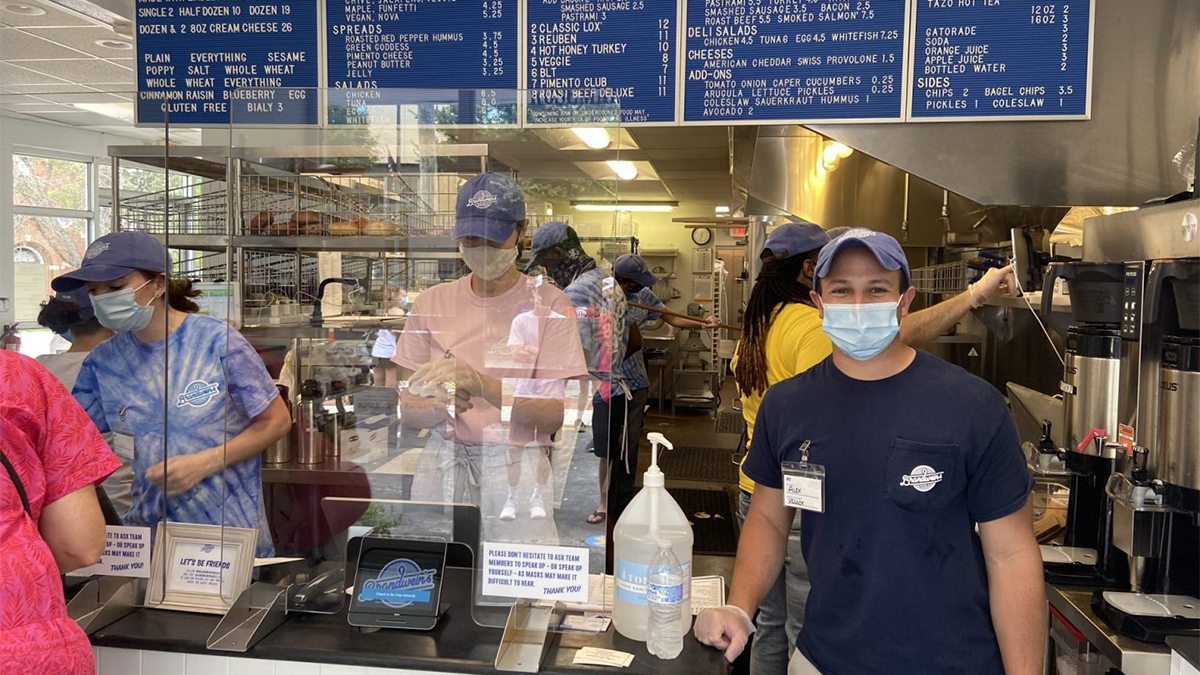Banking on bagels
Carolina graduate Alex Brandwein made the switch from investment banking and private equity to founding a Chapel Hill brick-and-mortar bagel shop in the middle of a pandemic.

Bagels were nowhere on the horizon when Alex Brandwein was sitting in his cubicle on the 39th floor of the many high-rises seen along the Manhattan skyline.
So how did he transition to owning and running a bagel shop with the oven burn scars up and down his forearms to prove it?
Brandwein said that reflecting, he simply never fit in the finance world. “It definitely felt like I was trying to push a square into a circle for the eight years that I did it.”
While he values all that he learned and the extraordinary experience that he had, he said “it never captured what I most loved, which is being with people.”
This realization and a bit of serendipity combined to set him on a new path. At a wedding of all places, Brandwein met a few Carolina professors. He thought to himself how great a school UNC-Chapel Hill must be for the bride and groom to invite them to one of the most important days of their lives.
That’s what ultimately tipped the scale toward UNC-Chapel Hill and the Kenan-Flagler Business School for him to pursue an MBA.
“I came here with no clear direction—open to exploring all the options. It was a lot of addition by subtraction in the beginning,” said Brandwein.
But what he did notice was that there was no downtown bagel shop. Seeing the success of bagel shops at his alma mater in Wisconsin and in Charlottesville with Bodo’s Bagels, he thought, “Man, Chapel Hill could really use one.”
With zero baking experience, zero cooking experience and a 100-hour workweek, Brandwein was used to just ordering sushi every night. But he started experimenting in the kitchen and ended up “absolutely loving it.”
Having fun and being open to change—that’s how Brandwein said he got to where he is today. But he doesn’t claim that it was easy. “Entrepreneurship is scary, it really is.”
This is why he is grateful to have found community in Launch Chapel Hill and the Entrepreneurship Center Apprentice Program at the business school. The Entrepreneurship Center Apprentice Program, formerly Adams Apprenticeship, takes nearly 30 undergraduate and graduate students every year and cultivates a life-long network of successful entrepreneurs. This is where Brandwein was connected to his personal executive training coach, various mentors and an entire cohort of supporters.
Brandwein calls Ted Zoller, the T.W. Lewis Professor of Strategy and Entrepreneurship who oversees the center’s teaching and outreach programs, “Mr. Connections,” because of all the doors he was able to open for him. “Without him,” said Brandwein of Zoller, “I wouldn’t have the team that I do today.”
Launch Chapel Hill, the startup accelerator managed by Innovate Carolina in downtown and created through a partnership between the University, Town of Chapel Hill and Orange County, was also equally impactful in giving Brandwein a support system.
Speaking of his Launch cohort, “It’s really helpful to have people that are going through similar things that I’m going through and knowing that I’m not alone in this.”
The COVID-19 pandemic caused him to make some changes to his business plan.
“I believe in brick-and-mortar and that’s what’s driven me,” said Brandwein. “I believe people want to get out, they want to interact, they want to have experiences in some form or fashion.” Although that is a little harder than normal now, he notes.
Society’s new way of doing things has pushed Brandwein to be creative about the business. He’s thinking about the physical space differently and how he and his team can be more thoughtful in terms of contactless transactions. Giving customers peace of mind about in-store safety helps create the experience Brandwein said his business aims for.
“People don’t need an experience buying sneakers anymore, but there are other ways to create experiences for people and I think food is definitely one of them.”
Brandwein believes that “what’s so magical about a bagel is that it can put a smile on your face.”
Bagels are a comfort food, but he wants to provide more than that. He wants to cultivate “a culture and environment that shows that treating people the right way and getting to know them and interacting with them, is special.”
“That’s what our brand is really about, and bagels are the engine to go and do that.”




